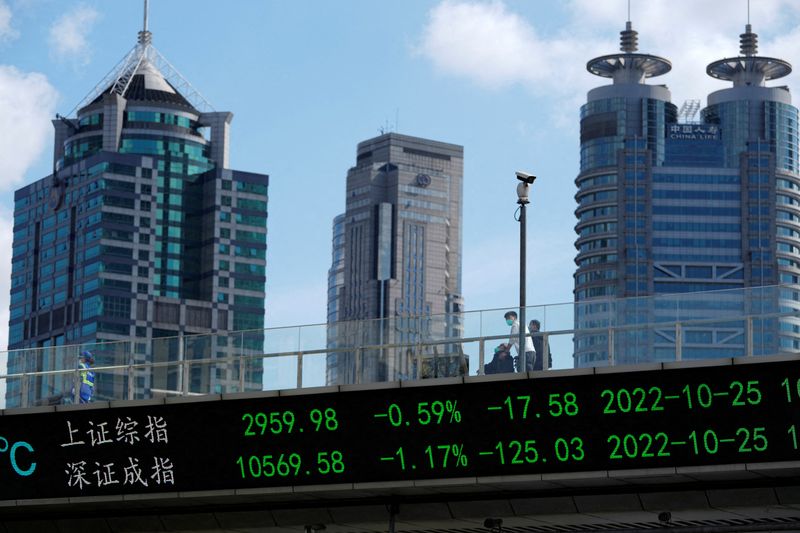Who is Kevin Hassett? Wolfe looks at the Trump ally tipped to become Fed Chair.
By Tom Westbrook and Dhara Ranasinghe
SINGAPORE/LONDON (Reuters) - Investors looking for clues about the state of China's economy beyond official data are seeing red warnings flash across a range of informal gauges, prompting many to back out of global assets exposed to the slowdown.
The selling is sucking the wind out of stock markets from London to Bangkok and weighing on China proxies from the Australian dollar to New Zealand dairy prices and shares from luxury goods giant LVMH to miner BHP and casino Las Vegas Sands (NYSE:LVS).
As the post-pandemic period has failed to bring a sustained recovery in consumer spending, or to thaw the near-frozen property market, most analysts now figure the world's second-largest economy is going to miss its 5% growth target this year.
Beneath the headlines, investors are even gloomier with higher-frequency and more arcane data from a shrinking current account surplus to ballooning deposits and soft surveys pointing to a deep-seated confidence problem.
"It's pretty weak," said Sat Duhra, a portfolio manager at Janus Henderson who devises a macro score for countries by tracking seven factors including PMI surveys, real exchange rates, current accounts, growth estimates and liquidity.
"PMIs have been weak, GDP is being revised downward. It's a tricky situation," he said. "And I don't see any point, at this point, in taking a bullish view on China when all of these things are going on."
His fund invests in China, but away from economically sensitive sectors such as banks, property or industrials.
Beyond China, which is the largest trading partner of most of its neighbours and other big economies, souring demand is beginning to take a toll.
New Zealand's Fonterra, the world's biggest dairy exporter, has cut its farm gate milk price forecast twice in a month citing "reduced demand from key importing regions." It previously noted that the largest slowdown was in China.
Last week BHP Group (NYSE:BHP) posted its weakest annual profit in three years and manganese-focused spinoff South32 (OTC:SOUHY) said profit fell by nearly two thirds. New Zealand's a2 Milk Co warned of weak growth in China's infant formula market.
Shares of BHP, S32 and a2 fell.
Seema Shah, chief global strategist at Principal Global Investors in London, sees the slowdown biting in Europe, where investors tend to connect the fortunes of German manufacturers with the those of their Chinese customers.
"We have become a bit more gloomy on Europe," she said, noting China also poses a risk to U.S. equities.
RETREAT
This year's run of bad indicators has wrong-footed investors, who had been positioning for companies such as BHP and currencies such as the Australian dollar and Thai baht to rally as China emerged from the COVID-19 pandemic in a blaze of spending.
Instead, Chinese visitors to top destination Thailand, for example, are barely a third of pre-pandemic levels, the baht is stalled and in Asia only Hong Kong's Hang Seng has fallen further than Thai stocks' 6.5% drop.
Even in Japan, the stock market success story of the year so far, portfolio manager Zuhair Khan at UBP Investments says he's shorting or avoiding companies reliant on China sales.
The scale of the problem, with data showing consumer and producer prices falling and youth unemployment running over 20%, indicates an aggressive policy response is needed, and quickly, he said, something that is so far yet to arrive.
To be sure, although they too have lately retreated, stocks of companies such as casino-operator Las Vegas Sands and luxury-goods seller LVMH are up 11% and 16%, respectively, this year, against a 10% gain for world stocks, and some investors remain bullish.
"We expect group travel to resume in late 2023 and support Chinese spend on luxury goods globally," said Prashant Bhayani, Asia chief investment officer at BNP Paribas (OTC:BNPQY) Wealth Management.
But it's now a waiting game for valuations to reflect more realistic assumptions.
"The China reopening as a thematic has played out to some extent. However, I think more importantly, it has fallen short of initial expectations," said Jagdeep Ghuman, a portfolio manager for U.S. asset manager Nuveen.
"It’s (now) very much on a case by case basis, driven by valuations. Overall we have seen that reset of expectations play out in the market and so there has been volatility in the shares of these companies."
